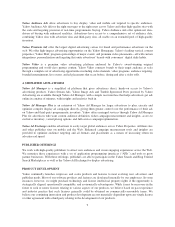Yahoo 2013 Annual Report Download - page 21
Download and view the complete annual report
Please find page 21 of the 2013 Yahoo annual report below. You can navigate through the pages in the report by either clicking on the pages listed below, or by using the keyword search tool below to find specific information within the annual report.consent decrees, or orders preventing us from offering certain features, functionalities, products, or services, or
requiring a change in our business practices, products or technologies, which could in the future materially and
adversely affect our business, operating results, and financial condition. See Note 12—“Commitments and
Contingencies” in the Notes to our consolidated financial statements.
On May 15, 2013, the Superior Court of Justice for the Federal District of Mexico reversed a judgment of U.S.
$2.75 billion that had been entered against us and our subsidiary, Yahoo! Mexico, in a lawsuit brought by
plaintiffs Worldwide Directories S.A. de C.V. and Ideas Interactivas, S.A. de C.V. The plaintiffs have appealed.
We believe the plaintiffs’ claims are without legal or factual merit. We do not believe that it is probable the
judgment will be reinstated on appeal, however we cannot predict the timing of a decision or assure the ultimate
outcome of the pending or further appeals. If we are ultimately required to pay all or a significant portion of the
judgment, together with any potential additional damages, interests and costs, it would have a material adverse
effect on our financial condition, results of operations and cash flows. We will also be required to record an
accrual for the judgment if we should determine in the future that it is probable that we will be required to pay
the judgment.
Our intellectual property rights are valuable, and any failure or inability to sufficiently protect them could
harm our business and our operating results.
We create, own, and maintain a wide array of copyrights, patents, trademarks, trade dress, trade secrets, rights to
domain names and other intellectual property assets which we believe are collectively among our most valuable
assets. We seek to protect our intellectual property assets through patent, copyright, trade secret, trademark, and
other laws of the U.S. and other countries of the world, and through contractual provisions. However, the efforts
we have taken to protect our intellectual property and proprietary rights might not be sufficient or effective at
stopping unauthorized use of those rights. Protection of the distinctive elements of Yahoo might not always be
available under copyright law or trademark law, or we might not discover or determine the full extent of any
unauthorized use of our copyrights and trademarks in order to protect our rights. In addition, effective trademark,
patent, copyright, and trade secret protection might not be available or cost-effective in every country in which
our products and media properties are distributed or made available through the Internet. Changes in patent law,
such as changes in the law regarding patentable subject matter, could also impact our ability to obtain patent
protection for our innovations. In particular, recent amendments to the U.S. patent law may affect our ability to
protect our innovations and defend against claims of patent infringement. Further, given the costs of obtaining
patent protection, we might choose not to protect (or not to protect in some jurisdictions) certain innovations that
later turn out to be important. There is also a risk that the scope of protection under our patents may not be
sufficient in some cases or that existing patents may be deemed invalid or unenforceable. To help maintain our
trade secrets, we have entered into confidentiality agreements with most of our employees and contractors, and
confidentiality agreements with many of the parties with whom we conduct business, in order to limit access to
and disclosure of our proprietary information. If these confidentiality agreements are breached it could
compromise our trade secrets and cause us to lose any competitive advantage provided by those trade secrets.
If we are unable to protect our proprietary rights from unauthorized use, the value of our intellectual property
assets may be reduced. In addition, protecting our intellectual property and other proprietary rights is expensive
and time consuming. Any increase in the unauthorized use of our intellectual property could make it more
expensive to do business and consequently harm our operating results.
We are, and may in the future be, subject to intellectual property infringement or other third-party claims,
which are costly to defend, could result in significant damage awards, and could limit our ability to provide
certain content or use certain technologies in the future.
Internet, technology, media, and patent holding companies often possess a significant number of patents. Further,
many of these companies and other parties are actively developing or purchasing search, indexing, electronic
commerce, and other Internet-related technologies, as well as a variety of online business models and methods.
19
























